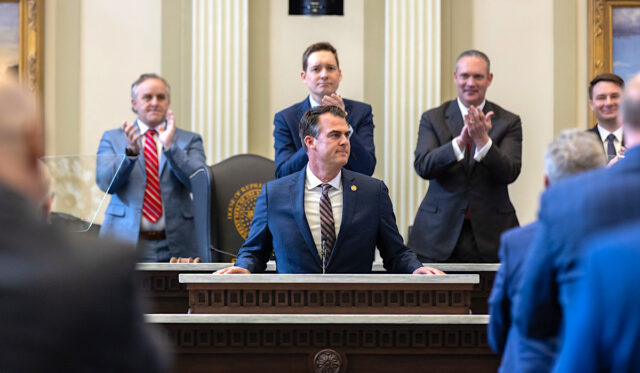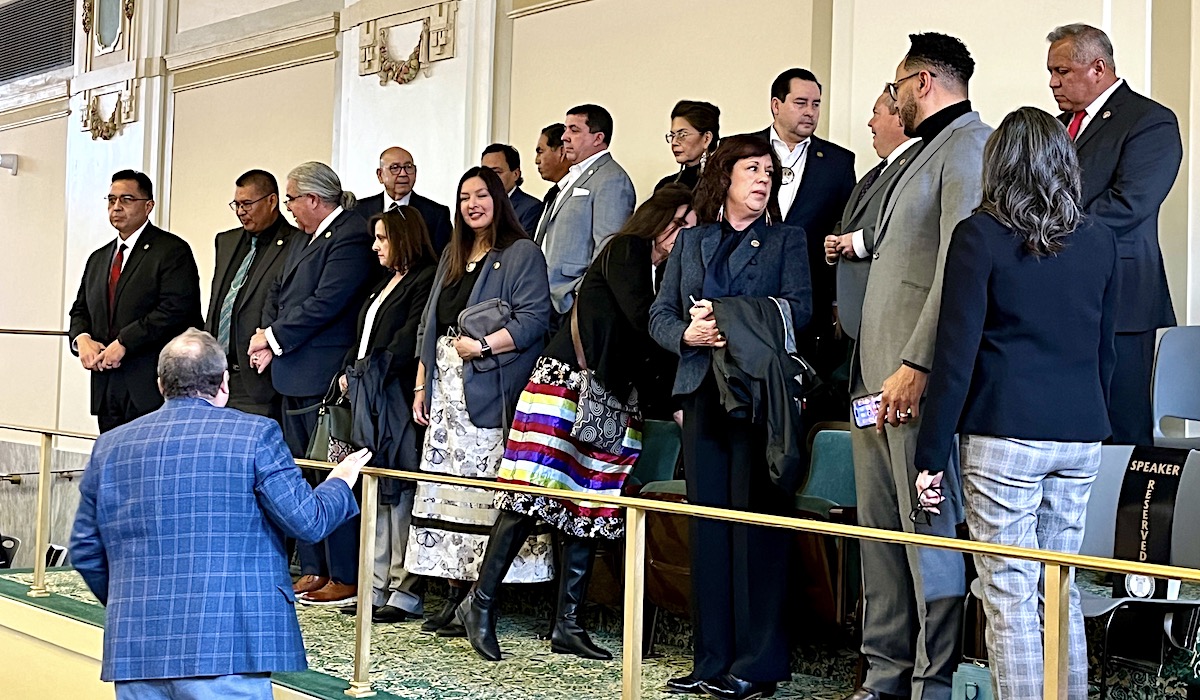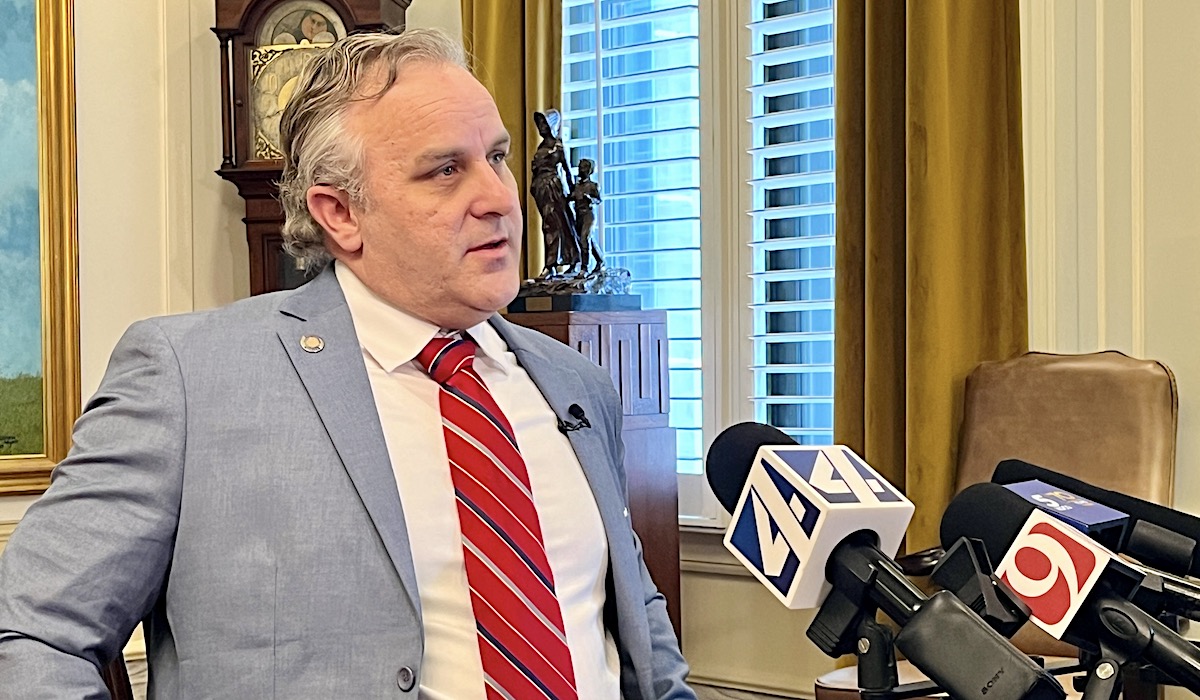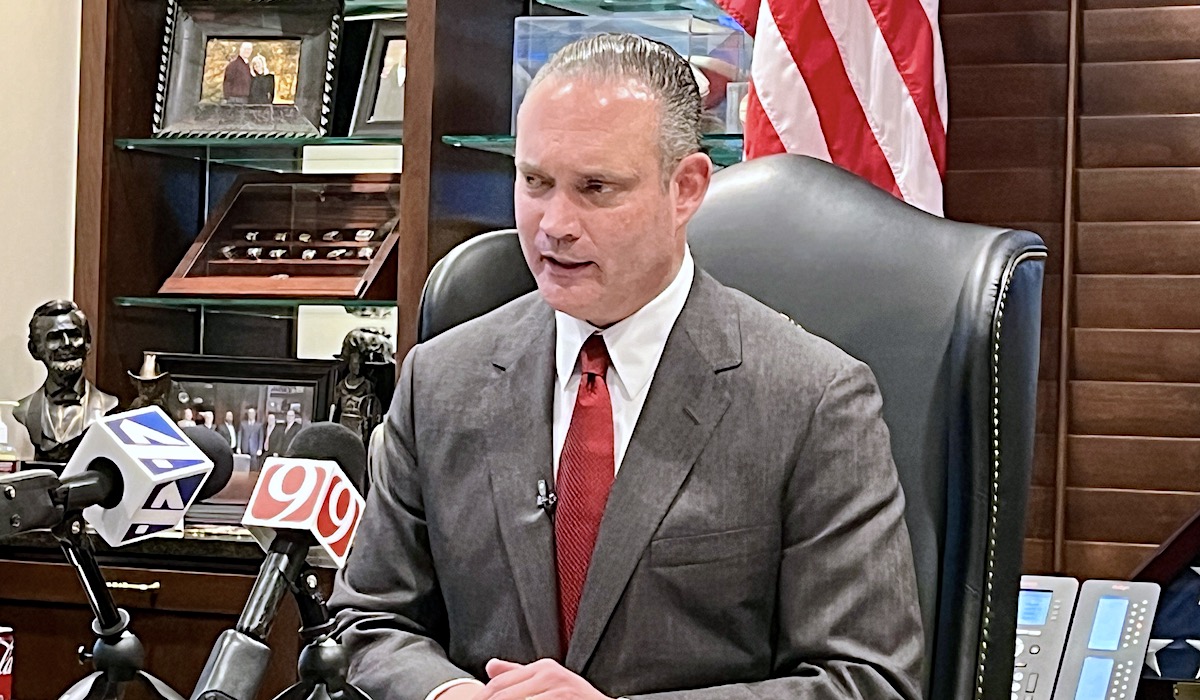

In a wide-ranging speech that repeatedly emphasized Christian principles, getting “government out of the way” and business recruitment goals, Gov. Kevin Stitt kicked off Oklahoma’s 2024 regular legislative session with a call for “flat budgets across state government” and a pledge to “sign any tax cut that comes to my desk.”
“To be clear, I’m not advocating for cutting core services. What I am advocating for is a sustainable amount of growth where we are funding needs not wants,” Stitt said. “Listen, there is never a shortage of new programs or someone pitching a good idea. In politics, you are only criticized for saying, ‘No.’ It’s easy to feel like you’re leading when the wind is at your back and you’re always saying, ‘Yes.’ But it’s our jobs as leaders to make the tough decisions now for (the) future prosperity of Oklahoma.”
Sitting behind Stitt for the year’s formal civic commencement, Senate President Pro Tempore Greg Treat agreed with many of the governor’s sentiments, but he told media afterward that he considered Stitt’s “tough decisions” line perfectly applicable to his own position: that any tax cuts should be considered carefully and with an eye to the long-term needs of state services.
“We don’t do these things in a vacuum. It’s easy to pass a tax cut. In the state of the state, it was talked about doing the hard thing is saying ‘No,’ and that’s leadership. It would be a lot easier for me to stand up and say, ‘I’m putting a quarter (of a percent) up there and we’ll cut it,’ and we’ll figure out how to pick up the pieces later,” said Treat (R-OKC). “I’ve taken a lot of beating from grassroots about, ‘Why has Treat turned into a RINO or whatever?’ No, I’m still as conservative as I ever have been. I still believe in small government. I still believe in lower taxes. But I believe in the wisdom of Oklahoma’s constitution that we do have to have a balanced budget, and so anything that I do is not in a vacuum.”
House Speaker Charles McCall (R-Atoka) has taken a different approach to start what could be a contentious year culminating a half-decade’s worth of sausage-making showdowns with Treat.
Last week in a Stitt-called special session, McCall and House Republicans advanced Stitt’s requested 0.25 percent income tax rate reduction, which carries a roughly $240 million fiscal impact, only slightly less than the roughly $280 million of anticipated new recurring revenues at play this session.
“I think we should make a tax cut. It’s long overdue. We would not be talking about the Board of Equalization number — it would not be as relevant this session if we had done this a year and a half or two years ago when it should have taken place,” McCall said. “Let’s keep in mind, you’re talking about money that you’re just going to leave with the people of Oklahoma in their pockets. They’re going to spend that money, and it’s going to come back to the people of the state of Oklahoma.”
Taken together, the positions staked out by Stitt, Treat and McCall on Monday reinforce the battle lines and battle scars borne of sessions past.
“Never in Oklahoma history have the same four elected officials served in our positions together for six full years,” Stitt said during his speech. “We haven’t always agreed, but we’ve accomplished a great deal working together for the people of Oklahoma. Thank you.”
Continued contention about tribal sovereignty, jurisdiction

With leaders of large sovereign tribal nations seated in the east House gallery, Stitt also outlined a litany of concerns he has about criminal and civil jurisdiction questions pending in appellate courts. He also referenced a brouhaha between Muscogee Nation Lighthorse officers and Okmulgee County jailers that spurred him to create a new task force about the effects of the U.S. Supreme Court’s 2020 McGirt v. Oklahoma decision, which affirmed a series of Indian Country reservations in eastern Oklahoma.
“Three years ago, in my State of the State, I asked a few questions stemming from the Supreme Court’s decision. In 2021, I asked: Do tribal members living in eastern Oklahoma pay income tax?” Stitt said toward the end of his speech. “Today, there are tribal governments supporting a woman named (Alicia) Stroble in her lawsuit before the Oklahoma Supreme Court so she can be exempted from paying income taxes in Oklahoma. In 2021, I asked who regulates agriculture? Water? Energy? Today, there are tribal governments trying to stand in the way of our state Department of Agriculture’s ability to issue necessary permits to farmers to work on their private land. In 2021, I asked what is the state’s ability to enforce the laws? There are tribal governments who supported a man named (Justin) Hooper as he fought against Tulsa police’s authority to enforce traffic laws. In 2021, I asked who had the authority to make arrests and prosecute people? Today, we are dealing with the fallout from the conflict at Okmulgee County Jail.”
Stitt’s litany of questions landed poorly with tribal leaders, who noted their concerns after the speech.
“He talks about basing things on race, that’s either a very cynical, strategic employment of rhetoric, or it’s borne of complete ignorance because we’re not talking about race, we’re talking about sovereign nations,” Cherokee Nation Principal Chief Chuck Hoskin Jr. said. “If he doesn’t get it at this point, I’m starting to doubt that he will.”
Muscogee Nation Principal Chief David Hill issued a statement Monday afternoon that stopped just short of calling Stitt a liar.
“Gov. Stitt once again demonstrated that honesty is not his strongest trait. McGirt has not caused confusion, but political games by politicians like Stitt have,” Hill said. “The law is clear, but rather than work together to integrate tribal jurisdictions to improve public safety, he has sought to reject it and sowed division.”
During Stitt’s speech in the House gallery, tribal leaders largely refrained from clapping on most of Stitt’s policy pitches, although Chickasaw Nation Gov. Bill Anoatubby — who recently signed new tobacco taxation and motor vehicle licensure compacts with Stitt — applauded lightly when Stitt said, “The state of our state is the strongest it’s ever been.” Similarly, Anoatubby clapped when Stitt promoted new rare-metal mining efforts in southern Oklahoma aimed at trying to “loosen China’s grip on these technologies.”
House Minority Leader Cyndi Munson (D-OKC) spoke with media after Stitt’s speech, saying there is “no way we can cut income taxes and continue to invest in Oklahoma.” She also panned his remarks about the impact of the McGirt decision.
“His continued conflict with tribal leaders is unacceptable. His comparison to what’s happening in Arizona to Oklahoma is unacceptable,” Munson said. “Our tribal leaders and tribal nations are great partners with the state of Oklahoma who do invest in public schools, who do invest in roads and bridges and who do invest in health care. And so, we personally took offense to that because we know of the great work that they’re doing across the state of Oklahoma, and they are a shining light of what it looks like to invest in yourself and invest in your government and invest in your people.”
Stitt also proposed establishment of a new sector within the state court system that would handle “business disputes.”
“I’m calling on the Legislature to take a page out of Delaware and Texas’ playbook and set up a system of courts specifically designed to address business disputes,” Stitt said. “Businesses need assurance that disputes will be adjudicated by courts with expertise in business law.”
Emphasizing that he did not mean it as criticism, Treat noted that a variety of topics mentioned by Stitt were not items already discussed between them.
“There will be things that none of us in this room envision coming up that will be the hottest topic in two weeks,” Treat said. “I’m sure of it.”
Stitt calls for flat budgets and education reforms

One year after a massive education funding and school choice tax credit package gummed up most of the 2023 session before an agreement was reached, Stitt did not call for additional teacher pay raises, instead emphasizing his desire for tax cuts and making a pitch for further charter school expansion that hinted at lingering frustrations about how Oklahoma City Public Schools handles its inventory of vacant school locations.
“Oklahoma is top-10 in charter school performance. Not only that, Oklahoma ranks No. 1 in the nation for smallest racial performance gap in charter schools,” Stitt said. “So why are there still barriers for charter schools to use vacant school buildings? Let’s put some of these vacant school facilities to use and get more high-performing charter schools up and running, especially in areas with failing public schools. More schools, more innovation, more freedom. Send me legislation that paves the way for more charter schools and gives students more options.”
Discussing higher education, Stitt continued to push for higher enrollment at the state’s top universities, but he also rekindled his past calls for “consolidating colleges and universities” if they are not focused on meeting “workforce needs.”
“To be the best, we need to shift our focus to outcome-based higher education models and stop subsidizing institutions with low enrollment and low graduation rates,” Stitt said. “Technology has transformed the way we do higher education, so we can’t keep relying on 20th-century education models to bring our students into the future workforce. Each college and university needs to focus on the subjects they are best at and become the premier institutions in their area.
“I want to see legislation that incentivizes models that fulfill our state’s workforce needs. I also want our regents to focus on consolidating colleges and universities that aren’t meeting this standard.”
McCall, whose district includes Murray State College, called Stitt’s remarks an “interesting perspective.”
“There is some consolidation that is going on that is voluntary, and that’s typically what the Legislature supports,” McCall said, referencing Murray State’s recent absorption of a higher education partnership in Ardmore. “If that’s the kind of consolidation that the governor is talking about, that has been supported. If it’s just arbitrarily picking two-year colleges or regional universities, picking winners and losers, that’s going to be a legislative fight, and those that represent those areas are going to be opposed to it.”
Stitt pitches civil asset forfeiture reform

Reactions to Stitt’s speech varied, with tax-policy polarity between the Senate and House highlighted when Stitt called for a 0.25 percent income tax rate cut and pledged to sign whatever tax cut lawmakers will send him.
House Appropriations and Budget Chairman Kevin Wallace (R-Wellston) stood and applauded Stitt’s touted tax cuts, but Senate Appropriations and Budget Chairman Roger Thompson (R-Okemah) did not.
Despite the moderate applause for tax cuts among Republican legislators, no lawmaker applauded Stitt’s request for “flat budgets.”
“The governor always gets the opportunity to talk about the budget first in the year,” McCall said. “I’ve heard it said that the governor gets to propose and the Legislature gets to dispose, so we’ll run through the process.”
When Stitt turned his attention to the topic of law enforcement, his remarks highlighted the duality of his conservative political rhetoric and criminal justice reform policy priorities.
“I want to put criminals on notice: You are not welcome here and you will serve time. We believe in fair sentences, and we believe in second chances. We’ve worked hard here to make sure we are prosecuting crimes and rehabilitating those with substance abuse and mental health struggles,” Stitt said, pausing to acknowledge applause from the Legislature’s minority party. “I knew I would get Democrats going in a second.”
“We are focusing on eliminating barriers for those who have served their time,” Stitt said, pausing. “With efforts like the Sarah Stitt Act and our drug court system, we are now No. 2 in lowest recidivism rates in the nation.”
Stitt asked lawmakers “to focus on limiting fines, fees and court costs to only what is needed for restitution.” Then he called for a reform pushed nationally by conservative and liberal criminal justice reform advocacy groups alike.
“We need to address civil asset forfeiture,” Stitt said, referencing the constitutionally questionable process by which law enforcement officers can seize property without criminal convictions or even filing charges. “It’s crazy to me that somebody can be pulled over and have their cash and truck taken for an alleged crime, get acquitted of that crime, but they still never get their property back. That isn’t fair and we need to make sure it isn’t happening anywhere in Oklahoma.”
Oklahoma Republican Party Chairman and Sen. Nathan Dahm (R-Broken Arrow) and conservative freshman Sen. Dusty Deevers (R-Elgin) joined progressive Sen. Mary Boren (D-Norman) and Rep. Mickey Dollens (D-OKC) in nodding, standing and applauding Stitt’s call to address civil asset forfeiture.
“There are transcendent principles that our government was founded upon. Those principles of equal protection and impartiality under the law, I’ll work with anybody on those,” Deevers said. “Fundamentally, government needs to be about equal protection and impartiality under the law, and whenever we are punishing people who have already been proven innocent by keeping their things, I just don’t think that’s fair or just.”
Treat said he was surprised to hear Stitt highlight the topic and that he did not know whether the governor has requested a specific policy change. He said he will need to review Oklahoma’s civil asset forfeiture rules, which last faced serious reform efforts in 2016.
“People should be treated as innocent until proven guilty, and our system should do that,” Treat said. “Philosophically, the government should have a very good case against somebody and prove guilt before they take away property.”




















